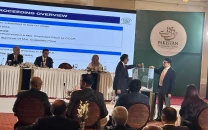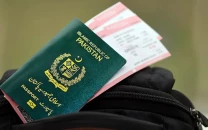Jinnah’s life, career and struggle: review of historiographical accounts
This discusses various historiographical approaches of scholars on Jinnah’s struggle that led to creation of Pakistan

The evolutionary changes in the historical writing over the years have influenced research interest of historians. Therefore, historical writing in the ancient times which used to focus mythical stories and religious faith shifted to humanistic, political and economic history. As a result, different styles of historical writing evolved.
The history of South Asia occupies an important and interesting place in historiography – which is the study of different approaches of historians to a specific topic, difference in their interpretations, the evaluation of sources used by historians, and the methodology adopted by them – especially since the movement for freedom from the British rule started in this region.
Mohammad Ali Jinnah – an important political figure in South Asian history and the founder of an ideological state – has been viewed and discussed by different historians in different ways. This write-up discusses the various historiographical approaches of eminent scholars on Jinnah’s struggle that led to the creation of Pakistan in 1947 after a sustained political struggle against the British and Hindus of British India.
Let’s start off with Quaid-i-Azam Mohammad Ali Jinnah: Myth and Reality written by Dr Waheed-uz-Zaman, a professor of history at Quaid-e-Azam University, Islamabad, and Director National Institute of Historical and Cultural Research, Islamabad. His other publications include Towards Pakistan; The Quest for Identity; Quaid-i-Azam: The Founder of the Islamic State of Pakistan; and Iranian Revolution: A Profile.
The book Quaid-i-Azam Mohammad Ali Jinnah: Myth and Reality was first published in 1976, and its revised edition was published in 1985 in the light of some important publications of that time. In the preface to the first edition of the book, the author has expressed his intention for writing this book: to remove misconception created about Jinnah by Hindus as well as some western writers.
The author answers the doubts about Jinnah’s ideology and adherence to the concept of the ‘Two Nation Theory’ that arose after Jinnah’s address to the First Constituent Assembly of Pakistan on 11th August, 1947 as a shift from Islamic to secular ideology. He analyses opinions and accusations by some noted critics. He also attempts to remove misconceptions about the British government’s support to Jinnah in the light of several political events including the Town Hall protest; resignation from Imperial Legislative Council in protest against the passage of the Rowlatt Act of 1919; rejection of the Simon Commission; opposition during the First and Second Round Table Conferences to special powers proposed to be vested in the Governor General and grant of commercial safeguard for British mercantile; and opposition to the issuance of White Paper in 1933 etc.
Arguing about Jinnah as a ‘fascist or democrat’, Dr Waheed-uz-Zaman compares him with Gandhi. With references, he has shown Gandhi as undemocratic, while admitting his leadership skills: “Jinnah, like Gandhi, was undoubtedly a leader of the rarest caliber. But despite the fact that he towered head and shoulders above his colleagues, he seldom bullied his followers into submission on any issue.”
According to the author’s analysis, the Qauid-e-Azam was a democrat who respected the right of the freedom of expression of Muslim League members and always consulted the League’s appropriate bodies for any important decision. In the closing chapter of the book, he praises Jinnah as ‘divine gift’ and ‘determined fighter’.
And now let’s discuss what is regarded as one of the best biographical books on the life of Quaid-e-Azam Muhammad Ali Jinnah. Jinnah of Pakistan is authored by American academic and Indologist Stanley Wolpert whose other books include Roots of Confrontation in South Asia; A New History of India (Second Edition, 1982); Morley and India 1906-1910; Nine Hours to Rama; and Tilak and Gokhale.
In the preface of Jinnah of Pakistan, Wolpert has clearly mentioned his intention of writing a complete biography of Jinnah: “I have been intrigued by the apparent paradox of Jinnah’s strange story, which has to date never been told in all the fascinating complexity of its brilliant light and tragic darkness.”
The author has covered private and public life of Jinnah along with his political and professional life. In the opening lines of his preface, he pays tribute to Jinnah who started his political career as Ambassador of Hindu-Muslim Unity and ended up as the architect of a nation-state for the Muslims of India.
“Few individuals significantly alter the course of history. Fewer still modify the map of the world. Hardly anyone can be credited with creating a nation-state. Mohammad Ali Jinnah did all three,” writes Wolpert in what is arguably the most fitting tribute ever paid to Jinnah.
Wolpert’s book on Jinnah starts off with his early life in Karachi and covers his early education years too. His personal life is narrated through an emotional mother-son relationship and his departure for London for studies. The author presents a balanced view of the liberal thoughts and the inspiration he found while studying law at Lincoln’s Inn that motivated him at the start of his professional and political career from Bombay, now Mumbai, on his return to India after completing his studies.
“Thanks to Dadabhai’s inspiring example, Jinnah entered in politics as a liberal nationalist joining Congress soon after his return to India,” writes Wolpert. He very well captures Jinnah’s liberal and nationalist leaning and acknowledges his sentiments for Hindu-Muslim unity he held despite persistent criticism from Gandhi who called him ‘Mohammadan’.
“What an odd fact to single out for comment about this multifaceted man, whose dress, behavior, speech and manner totally belied any resemblance to his religious affiliation! Jinnah, in fact, hoped by his Anglophile appearance and secular wit and wisdom to convince the Hindu majority of his colleagues and countrymen that he was indeed, as qualified to lead any of their public organization as Gokhale or Wedderburn or Dadabhai,” writes the famed American author about Jinnah’s political traits.
Impressed by Jinnah’s leadership skills and political insight, Muslim League members insisted him to join them. While Jinnah did join Muslim League in 1913, his services as Ambassador of Hindu-Muslim Unity continued. Lucknow Pact of 1916, an agreement between the Muslim League and the Congress for making a joint demand for self-government, is acknowledged by Wolpert as a great political achievement by Jinnah.
The author describes Jinnah’s attempt as an intellectual to create communal harmony in India in these words: “His mind raced years ahead of most of his contemporaries, British and Indian alike. Unfortunately, the Lucknow Pact was never implemented, but its adoption marked the high point of Indian nationalist unity and provided as liberal and rational a constitutional framework for governing the subcontinent of South Asia as any subsequent plan devised after years of labor, vast expenditure, and much precious blood had been wasted.”
The liberal political thoughts of Jinnah influenced his personal life as well. Since Jinnah believed in communal relationship, he loved and married a Parsi girl, Ruttie, in April 1918, even without obtaining the consent of her father, Sir Disnshaw Petit, who was also a friend of Jinnah. Wolpert describes these moments of Jinnah’s life beautifully, enabling readers to view a political leader and a barrister through soft feelings of life.
The dramatic change in Jinnah’s political thoughts; his insistence on a united independent India in the beginning; his efforts for winning mass support for Muslim League as the sole representative of the Muslims of British India; his fight for an independent Pakistan; change in his political stance towards Congress; and a noticeable shift in his dressing style have been masterly covered by Wolpert as he depicts his journey from Jinnah to Quaid-e-Azam.
And with Pakistan born, Jinnah burnt midnight oil despite his falling health in the face of growing challenges to a newly-born country – all covered in a way by Wolpert for the readers to admit the greatness of the Great Leader.
Acknowledgement for a leader in the rival clan is rare – however, not so in the case of Jinnah.
Jinnah: India, Partition, Independence, authored by Jaswant Singh – one of the founding members of Bharatiya Janata Party and a Cabinet Minister in Prime Minister Atal Bihari Vajpayee’s government from 1999 to 2004 – could not help acknowledging Jinnah as a great leader. The book, a political biography of Jinnah, makes a scholarly attempt to undo the wrong perception of Jinnah being mainly responsible for the partition. Published in 2010, the book portrays Jinnah’s political journey from being the Ambassador of Hindu-Muslim Unity to the Quaid-e-Azam, and explores the background of India, the ground realities that led to the partition, and the aftermath.
It was Singh’s historical journey to Lahore by bus in 1999 as India’s foreign minister along with Mr Vajpayee, the Prime Minister then, that tempted him into pen-sketching the founder of the archrival nation.
The book commences with a brief description of the vast Muslim Empire that started shaping up during the time of Prophet Muhammad (peace be upon him) around 630 AD and continued to expand later on, reaching the Indian land through the invasion of Sindh by Muhammad Bin Qasim in 712 AD. The author has used this Indo-Islamic history background to examine Indian Muslims history; the demand by All India Muslim League for a separate homeland; and the reasons that resulted in the partition. Singh has written this biography to explain Jinnah’s significant role in the partition.
The book traces the consequences of the 1857 war and its impact on the Muslim community of India who had lost their glorious empire to the British. It also discusses the various reformist movements that were launched in a bid to revive the lost status of the Muslims. Based on this background, the book tries to investigate the foundation of the claim for a separate nation made by the Muslims under Jinnah nearly a century later.
In the light of Lord Dufferin’s comments -- as follows – about the Muslim community and their glorious rule, the author of the book assesses the awareness of the Muslims to restore their self-image: “A continuing search for a new role, a new relevance, some responsibility, opposition in life to which they were accustomed, made the Muslim community begin to reach outwards. It was this impulse that finally persuaded Muslims of India to resort to political activism.”
Moreover, the language divide between the Muslim and Hindu communities transformed political parties into religious parties and gave rise to a conflict of language based on the script. To add to that was the backing by Congress of the anti-partition agitation by Hindu rulers in response to the partition of Bengal in 1905. But Singh insists that the wish for revival of their glorious past was the prime reason for the Muslims to seek share in power and led to the Simla Deputation in 1906 whereby the Muslims mooted a separate electorate demand which was approved by the British.
Singh introduces Jinnah’s political thoughts at the start of his political career from the Congress platform in these words: “By this time Jinnah had been Congressman of Pherozeshah Mehta group (the moderate group of Congress, which amongst others included Dadabhai Naoroji, Gopal Krishna, Gokhale and their group included Tilak, Bipin Chandra Pal and Lai Lajpat Rai) and also, secretary to Dadabhai Naoroji who was presiding over the Calcutta Congress. The Simla Deputation did not amuse Jinnah at all.”
From ‘Jennabhai to Jinnah’ is what sums up the details that the author covers, including Jinnah’s birth; his family background; religious faith as Khoja Muslim; early education and his trip to England to seek a degree in law; and his initial political experiences, especially in relation to Dadabhai who turned out to be his first political inspiration.
He gives a fleeting account of the personal loss Jinnah suffered in the shape of the death of his mother and his wife – and his loneliness thereby. He then moves on to how Jinnah, who initially opposed separate electorate for Muslims, fought for their identity. On his return from England in 1913, he joined the Muslim League alongside remaining a member of the Congress.
“At this juncture, not only was he taking steps to bring about unity between the League and the Congress, he was also striking a balance between the Moderates and the Extremists. In politics now all factions gave him recognition – the Extremists, the Moderates, the Muslims, the Hindus, the Parsis and others,” writes Singh about Jinnah’s popular appeal.
While Jinnah was working for unity and cooperation between the Congress and the Muslim League, it was the introduction of UP Municipal Bill 1915-16 over the provincial interest’s issue that led Jinnah to change his mind. Describing this phase as the turning point in Jinnah’s political thoughts, Singh writes: “In 1913, he was still a passionate advocate of joint electorates; by 1916 he had begun to argue with the Congress leaders that unless Muslims’ demand for separate electorate was conceded a settlement could not be reached. This is where Jinnah, the Muslim leader, first begins to emerge; the compelling rationale for this transformation being the existing political reality of the country, his own largely national political constituency, and his public standing.”
The Congress formed a coalition government in UP after the 1937 elections while ignoring the Muslim League for an alliance, citing its secular tenets. To Singh, it was another mistake made by Congress: “Yet again this carried a very serious and damaging message for the future of the united India: that in a majoritarian, Congress ruled India there was place for Muslims, indeed, for any political minority, unless the Congress found itself in a corner, then it would ally with anyone.”
Singh writes that this “mistake” by Congress gave birth to the concept of parity between majorities and minorities. It paved the way for Jinnah to strengthen the Muslim League as ‘sole spokesman’ of the Muslim community of India: “In this task Jinnah was, of course helped by many factors and events, but also by policies of both the Congress and the British government.”
This is how Singh makes an attempt to clear the misunderstanding about Jinnah being the only man behind the partition. His book, however, stirred a huge political controversy in India and earned him the wrath of the so-called brigade of patriots.
And now a few lines on a recent scholarly contribution to Jinnah’s political journey. Authored by political scientist Dr Ishtiaq Ahmed and published in 2020, Jinnah: His Successes, Failures and Role in History carries a different historiographical approach on the matter. The author explicitly expresses the idea behind his work to be based on distinct classification of four stages of Jinnah’s political career: “Indian nationalist, Muslim communitarian, Muslim nationalist and the all-powerful head of State of Pakistan. Each stage epitomizes a central political objective on which he concentrated and the concomitant arguments, decisions and actions undertaken by Jinnah to achieve that objective.”
In the absence of any personal memoirs or diaries by Jinnah, the historians and scholars contribute to fill the gap concerning the aims and objectives of Jinnah’s political struggle and endeavours by throwing light on the realities of the pre-partition era. The differences in historiographical approaches clearly reveal that Mohammad Ali Jinnah’s life and struggle – no matter viewed through different sets of mind – testify to the truth and sincerity of his political journey to Pakistan.

















COMMENTS
Comments are moderated and generally will be posted if they are on-topic and not abusive.
For more information, please see our Comments FAQ